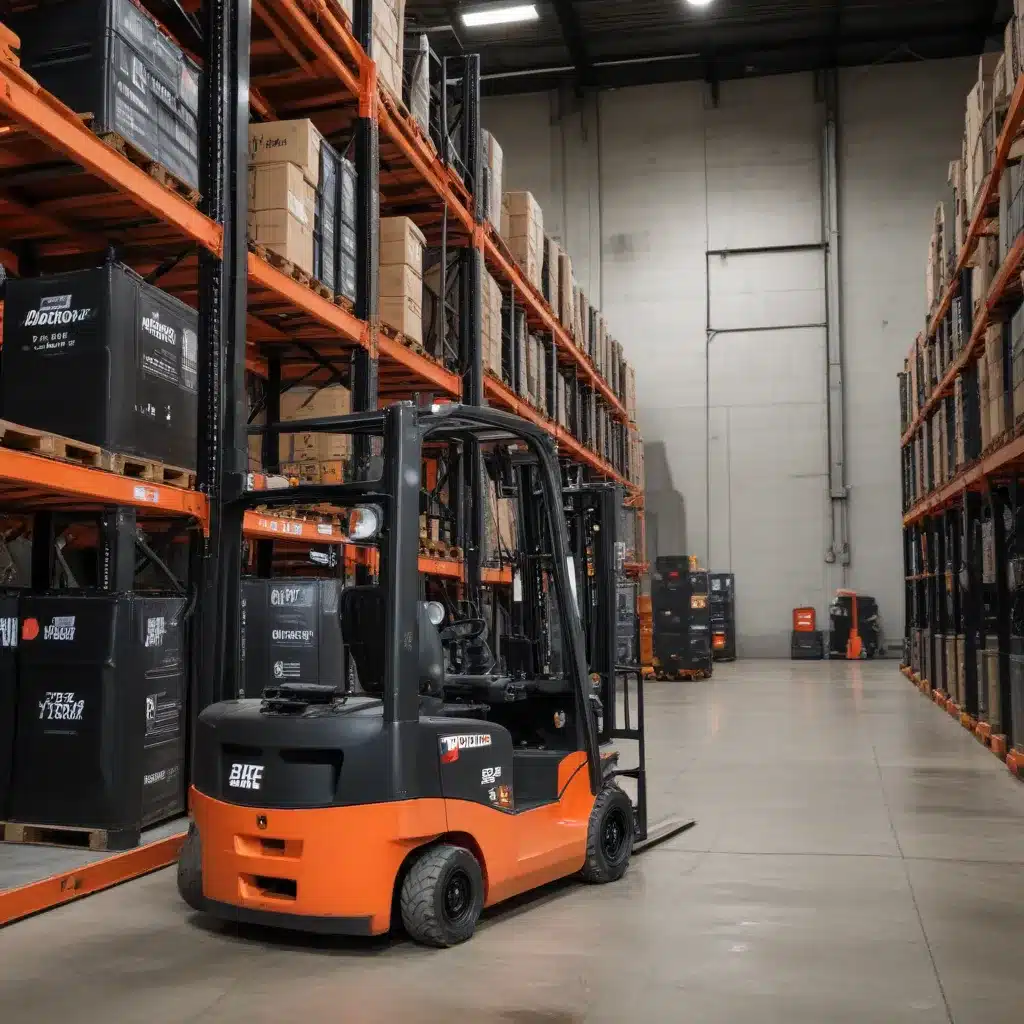
Maintaining Forklift Batteries for Optimal Efficiency
As a seasoned industry expert in forklifts, warehousing, and logistics, I understand the crucial role that forklift batteries play in ensuring the smooth and efficient operation of your material handling operations. Properly maintaining your forklift batteries is essential to maximize their performance, extend their lifespan, and avoid costly downtime. In this comprehensive guide, we’ll delve into the best practices for forklift battery care, empowering you to make the most of your investment.
Recognizing the Signs of a Failing Forklift Battery
Staying vigilant and attentive to the health of your forklift batteries is the first step in maintaining optimal performance. Be on the lookout for the following signs that may indicate a battery is in need of attention:
- Diminished Power: If your forklift is struggling to lift loads or has reduced acceleration, it could be a sign of a failing battery.
- Shorter Run Time: If you find yourself needing to recharge the battery more frequently than before, it may be time for a replacement.
- Visible Damage: Physical damage such as cracks, leaks, or corrosion on the battery can compromise its integrity and performance.
- Overheating: Excessive heat coming from the battery during operation is a red flag that should be addressed promptly.
- Low Electrolyte Levels: In batteries with removable caps, low electrolyte levels can affect the battery’s overall performance.
By recognizing these warning signs early on, you can take proactive steps to address any issues and maintain the optimum efficiency of your forklift batteries.
Implementing Proper Maintenance Practices
Regularly maintaining your forklift batteries is crucial to ensure they perform at their best and have a long lifespan. Here are some essential maintenance tips to keep your batteries in top condition:
-
Inspect Regularly: Visually inspect the batteries for any signs of damage, such as cracks, leaks, or corrosion. Address any issues promptly to prevent further deterioration.
-
Check Water Levels: For batteries with removable caps, regularly check the electrolyte levels and refill with distilled water as needed to maintain the proper levels.
-
Clean Terminals: Keep the battery terminals clean to prevent corrosion, which can impede the flow of electricity and reduce the battery’s efficiency.
-
Follow Manufacturer Guidelines: Adhere to the manufacturer’s recommendations for charging, storing, and maintaining your forklift batteries to ensure optimal performance and longevity.
By diligently following these maintenance practices, you can maximize the efficiency and extend the lifespan of your forklift batteries, ultimately saving you time and money in the long run.
Understanding Charging Practices
Proper charging practices are crucial for maximizing the lifespan of your forklift batteries. Overcharging or undercharging can significantly decrease the battery’s efficiency and longevity. To ensure optimal performance, it’s essential to follow the manufacturer’s charging guidelines and schedule regular maintenance checks to prevent any potential issues.
One of the key charging considerations is the type of charger used. Using the wrong charger for your specific battery type can cause damage, so it’s crucial to consult with the manufacturer or a professional to ensure you’re using the correct charger. Additionally, be mindful of the charging environment, as proper ventilation is essential to prevent overheating, which can also compromise battery performance.
By adhering to the manufacturer’s charging recommendations and maintaining a consistent charging routine, you can help extend the lifespan of your forklift batteries and avoid unexpected replacements.
Selecting the Right Forklift Battery
When choosing a battery for your forklift, there are several factors to consider to ensure compatibility and optimal performance. Start by determining the voltage and capacity requirements of your forklift model, as this will guide your selection. Additionally, you’ll need to decide between lead-acid and lithium-ion batteries, taking into account your budget, power needs, and charging preferences.
Once you’ve identified the suitable battery type, evaluate the available charging options to ensure they align with your operational requirements. Consulting with a professional can be highly beneficial in ensuring you select the right battery and charging system for your forklift, maximizing efficiency and productivity.
Prioritizing Safety in Forklift Battery Maintenance
When maintaining forklift batteries, safety should be of utmost importance. Always wear the appropriate personal protective equipment, such as gloves and goggles, to prevent any accidents or injuries. Be cautious when handling batteries, as they contain corrosive materials that can cause harm if not handled properly.
Ensure the work area is well-ventilated to prevent the buildup of harmful fumes, and follow all manufacturer guidelines and recommendations when performing maintenance tasks. Avoid overcharging your forklift batteries, as this can reduce their lifespan. Additionally, regularly check the water levels in the batteries and top them up as needed with distilled water to maintain optimal performance.
Proper disposal of old forklift batteries is also crucial to prevent environmental damage and ensure the safe handling of hazardous materials. Follow the appropriate recycling procedures to ensure the responsible disposal of these batteries.
By prioritizing safety and adhering to best practices, you can protect your employees, the environment, and the longevity of your forklift batteries.
Conclusion: Unlocking the Full Potential of Your Forklift Batteries
Taking good care of your forklift batteries can significantly enhance the efficiency and productivity of your material handling operations. By implementing a comprehensive maintenance routine, following proper charging practices, and selecting the right batteries for your needs, you can maximize the performance and longevity of your forklift fleet.
Remember, a well-maintained forklift battery not only improves immediate performance but also contributes to the long-term sustainability of your equipment. Prioritizing battery care should be a key component of your overall forklift maintenance strategy, ensuring your material handling operations run smoothly and efficiently.
For more information on forklift reviews, safety guidelines, and industry trends, be sure to explore the Forklift Reviews blog. By staying informed and proactive in your forklift battery care, you can unlock the full potential of your material handling equipment and drive your business forward.

